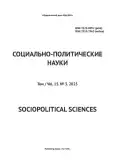Историческая эволюция дискурса о средствах массовой информации в политической науке
- Авторы: Милецкий В.П.1,2, Емелин Я.А.1
-
Учреждения:
- Санкт-Петербургский государственный университет
- Санкт-Петербургский государственный электротехнический университет «ЛЭТИ»
- Выпуск: Том 15, № 3 (2025)
- Страницы: 42-50
- Раздел: Политические институты, процессы и технологии
- URL: https://journals.eco-vector.com/2223-0092/article/view/687837
- DOI: https://doi.org/10.33693/2223-0092-2025-15-3-42-50
- EDN: https://elibrary.ru/RHOQEK
- ID: 687837
Цитировать
Полный текст
Аннотация
Политическая наука, обладающая уникальным методологическим и богатым эмпирическим аппаратом, формировалась без преувеличения веками, столетиями. Периодизация развития политической науки охватывает сразу несколько исторических вех: Античность, Возрождение, Просвещение, современный период. На каждом позитивные знания аккумулировались, систематизировались, приобретали очертания автономной теоретической науки, имеющей теперь и прикладное значение. Неоценимый вклад в формирование и развитие политической науки внесли такие мыслители и ученые, как Платон, Цицерон, Аристотель, Сократ, Томас Гоббс, Джон Локк, Жан-Жак Руссо, Николо Макиавелли, Джон Мильтон, Джон Милль, Томас Мор, Герберт Спенсер, Карл Маркс, Карл Поппер и др. Институционализация политической науки или собственно политическая институционализация неразрывно связана с описанием и обоснованием эффективности и стабильности политических процессов, которые протекают в различных политических системах. В рамках структурного и функционального анализа ключевым гражданским институтом любой политической системы являются средства массовой информации. Разумеется, в привычном понимании традиционные медиа формировались и развивались значительно позже, чем возникали первые размышления о государстве, его устройстве, категориях свободы, справедливости, разделения властей, но концептуальная и объясняющая база, которая существует сегодня, сформировалась не сразу. Более того, теоретические, методологические, эмпирические основы изучения средств массовой информации требуют мультипарадигмального подхода. Целью данной работы является теоретическая интерпретация универсальных и общих понятий, которые корреспондируются с заявленной темой настоящего исследования, и находят свое отражение на концептуальном и эмпирическом уровнях политической науки.
Полный текст
Об авторах
Владимир Петрович Милецкий
Санкт-Петербургский государственный университет; Санкт-Петербургский государственный электротехнический университет «ЛЭТИ»
Автор, ответственный за переписку.
Email: falesm@mail.ru
SPIN-код: 2756-6273
доктор политических наук; профессор кафедры социологии политических и социальных процессов; профессор кафедры социологии и политологии
Россия, Санкт-Петербург; Санкт-ПетербургЯрослав Александрович Емелин
Санкт-Петербургский государственный университет
Email: emelinyaroslav@yandex.ru
SPIN-код: 7518-3328
аспирант кафедры социологии и политологии
Россия, Санкт-ПетербургСписок литературы
- Аристотель. Политика / пер. с др.-греч. С. Жебелева. М.: Эксмо, 2022. 384 с.
- Батыгин Г.С. Структурный функционализм Толкотта Парсонса // Вестник РУДН. 2003. № 4–5. С. 6–34.
- Бентам И. Введение в основания нравственности и законодательства. М.: РОССПЭН, 1998. 415 с.
- Бодрунова С.С. Парадигмы «адвокатирования» и «арбитража» в западной журналистской этике и их ценностно-нормативное наполнение // Социология и Право. 2014. № 1 (23). С. 16–23.
- Гоббс Т. Левиафан, или Материя, форма и власть государства церковного и гражданского. М.: Мысль, 2001. 240 с.
- Демьяненко Н.В. Свобода личности и целостность государства в социологической интерпретации Г. Спенсера // Вестник Нижегородского университета им. Н.И. Лобачевского. 2012. № 2 (26). С. 21–27.
- Кузьмина С.В. Роль СМИ в формировании имиджа политического деятеля // Известия Саратовского университета. 2012. Т. 12. № 2. С. 69–72.
- Милецкий В.П., Емелин Я.А. К вопросу о методологических основах изучения «Четвертой ветви власти» как института политической системы современного общества // Дискурс. 2024. Т. 10. № 3. С. 75–85. doi: 10.32603/2412-8562-2024-10-3-75-85.
- Макиавелли Н. Государь. О военном искусстве / пер. с итал. Г. Муравьевой. М.: АСТ, 2023. 320 с.
- Марков К.В., Сивкина Н.Ю. Политические учения античного мира: учеб.-метод. пос. Н. Новгород: Нижегородский гос. ун-т, 2017. 80 с.
- Милль Дж. О свободе. М.: Юрайт, 2024. 128 с.
- Михайлина С.А., Попов Н.А. Век Просвещения: рождение новых наук Экономические и социально-гуманитарные исследования. 2023. № 4 (40). С. 198–206.
- Мор Т. Утопия / под общ. ред. В.П. Волгина; пер. с лат. и коммент. А.И. Малеина. М.; Л.: Изд-во академии наук СССР, 1935. 270 с.
- Платон. Государство / пер. с др.-греч. А.Н. Егуновой; вступ. ст. Д.С. Хаустова. М.: РИПОЛ классик, 2021. 586 с.
- Поппер К. Предположения и опровержения: Рост научного знания / пер. с англ. М.: АСТ; Ермак, 2004. 638 с.
- Руссо Ж.-Ж. Об общественном договоре, Или принципы политического права. М.: Юрайт, 2023. 146 с.
- Семенов А.В. Переосмысливая гражданское общество: нормативная концепция публичной сферы Ю. Хабермаса // Социум и власть. 2009. № 4. С. 9–13.
- Сиберт Ф., Шрамм У., Питерсон Т. Четыре теории прессы / пер. с англ. M. Полевой. М.: Национальный ин-т прессы; Вагриус, 1998. 223 с.
- Тит Л.К. О природе вещей / пер. с лат. Ф. Петровского. М.: Художественная литература, 1983. 383 с.
- Цицерон М.Т. О государстве / пер. с лат. В.О. Горенштейна. М.: АСТ, 2022. 416 с.
Дополнительные файлы











